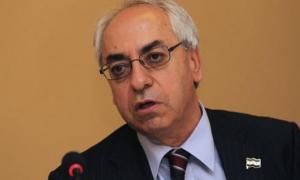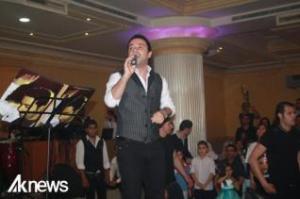
New SNC Leader: Talk of Federalism Causes Fear and Anxiety

A few weeks ago, the Syrian National Council (SNC) – the largest Syrian opposition group – elected Dr. Abdulbasit Sieda, a Kurd, as its new chief. Born in 1956 in the Kurdish town of Amude, northeast Syria, Sieda is a philosophy professor and prominent opposition figure, known for his political activism. He was one of the founders of the SNC, and as leader has emphasized the importance of unifying Syrian opposition groups against the regime of Bashar al-Assad. He picked up this theme in a conversation with Rudaw.
Rudaw: Did you ever believe that one day you or another Kurd would be leading this council?
Abdulbasit Sieda: Yes, because when we first created the council, members were talking about me then as a possible leader. Some people might wonder how a Kurd could become leader, but the council is past this stage now and all Syrian citizens have the right to be chosen as leader.
Rudaw: Who is in charge of making decisions and choosing the policies of this council, the leader of the council or the members?
Abdulbasit Sieda: The role of the leader is to assign duties and direct the council. There are many organs within the council such as political parties, organizations, youth movements and committees, and they all speak before making decisions so that they are made collectively.
Rudaw: After the Syrian National Council refused to accept the right to self-determination for Kurds, the Kurdish National Council (KNC) criticized them. How did they (KNC) receive your selection as leader?
Abdulbasit Sieda: I believe that stage is in the past. We are currently going through a new stage and the Kurdish Council recently met and released a new document regarding their vision for solving the Kurdish issue. The Syrian National Council has also released a new document and both of these documents have brought the two sides closer and instigated talks between us. Now relations between both councils are good and the stance of the Kurdish Council towards our new vision is positive.
Rudaw: The Kurdish National Council is emphasizing the right to self-determination for Kurds. Do you believe that the Syrian National Council will accept this demand?
Abdulbasit Sieda: The issue of self-determination is not a demand but a principle, and the Kurdish National Council has addressed this issue in its recent announcements.
Rudaw: Burhan Ghalioun, the former leader of SNC, previously told Rudaw in an interview that there was no such thing as Syrian Kurdistan. As a Kurd, how do you validate this statement?
Abdulbasit Sieda: No, these statements were not right. At the time, I released a statement which clarified that these were not the views of the Syrian National Council. Such statements create tensions between the parties and they need to be dealt with differently. Those statements were not right but I believe this is something from the past and relations inside the Syrian National Council have improved.
Rudaw: A delegation from the Kurdish National Council has been in Turkey for some days and I believe they are there to talk with the Syrian National Council. Have the two made any agreements?
Abdulbasit Sieda: They went to Turkey to take part in a meeting in Istanbul which would pave the way for another general meeting to take place in Cairo. I find their participation to be a very positive step and they have contributed well. The talks went well and I hope to meet with them again soon in Cairo and serve the interests of Syrians in general and Kurds in particular. Our plan is to make a Syria for all nations including Kurds, Arabs, Assyrians and Turkmen. No one should be afraid in the new Syria.
We know that the Kurdish issue in Syria is an important one as they have been oppressed for many years. The oppression against Kurds in Syria has two layers. One layer is manifested by denying Kurds their right to have citizenship, and the second layer is the violation against their land and property, changing the names of their villages and cities into Arabic names and taking away the right to education in their mother tongue. Our youth cannot benefit from police or military colleges and they are not allowed to receive higher education. These issues need to be solved in a democratic way within the framework of Syria.
“Our plan is to make a Syria for all nations including Kurds, Arabs, Assyrians and Turkmen,”Rudaw: In some cities in Syrian Kurdistan, there were slogans demanding federalism for Syrian Kurds. Do you listen to people's demands?
Abdulbasit Sieda: I can tell you frankly that discussion of federalism requires a different time. Sometimes these talks create fear and anxiety as people ask questions about where they may lead. It is difficult at the moment but what is more important is to solve the Kurdish issue in a democratic manner and eradicate the injustices against them. Then in another phase, other outstanding issues like federalism can be solved more easily.
Rudaw: You mentioned the rights of Kurds several times. What rights you believe are important for Kurds?
Abdulbasit Sieda: Cultural rights, political rights, administrational and social rights. The routes to achieve them need to be discussed.
Rudaw: The PYD (Democratic Union Party) is an important part of the Syrian opposition. Do you believe that one day they will join the Syrian National Council? Have you made any efforts in this direction?
Abdulbasit Sieda: I hope they will join us and bring a part of the Kurdish opposition with them. I believe some colleagues are working on this and all of us need do our part to achieve this unity. At the same time, we should never allow confrontations among Kurds. Issues need to be solved peacefully.
Rudaw: Are those who are carrying out talks with the PYD from the Syrian National Council or the Kurdish National Council?
Abdulbasit Sieda: I believe more talks are carried out by the Kurdish National Council.
Rudaw: Does it mean that the Syrian National Council has not moved in that direction yet?
Abdulbasit Sieda: I do not know, but I find any steps in that direction to be positive. I am not against it, especially when our views merge and they start to consider themselves part of the Syrian revolution.
Rudaw: Do you support military intervention in order to stop the bloodshed in Syria?
Abdulbasit Sieda: We have never said that there should be intervention in Syria, but we do say that the world must act as the daily killings in Syria are intolerable. It should be within the United Nations’ framework and under Chapter VII of the U.N. Charter to reach a solution that would force the Assad regime to stop its aggression against the Syrian people.
Rudaw: So this means you do not want a repetition of what happened in Libya in Syria?
Abdulbasit Sieda: No, the situation in both countries is different, but we find it necessary that the international community stands up to its responsibilities in order to stop the war in Syria and give the Syrian people their rights to democracy, freedom and justice.
- 4722 reads


